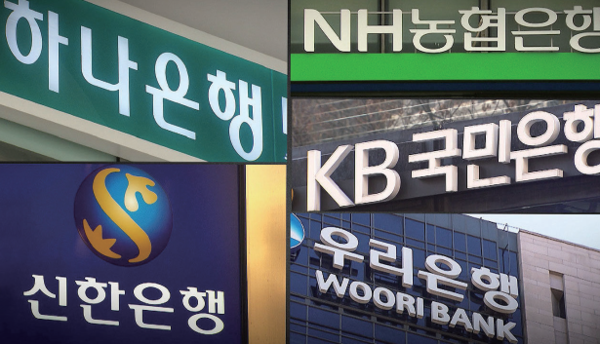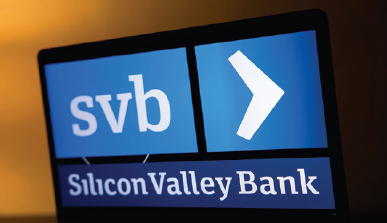On March 10th, the Silicon Valley Bank (SVB) — the 16th largest bank in the United States (U.S.) — went bankrupt and upended the global financial markets. Besides its direct aftermaths, such as the damage to SVB users, the event caused a buttefly effect that put the brakes on the Korean government’s financial reform plans and the rise of challenger banks that modeled the SVB. Therefore, the Sungkyun Times (SKT) will examine whether the present bank is oligopolistic, the voices surrounding the revision plans, and an appropriate course of action.
Korea's Banking System, Is It an Oligopoly?
-Today’s Korean Banking System
In Korea’s banking market, five of Korea’s so-called biggest banks own a high market share: KB Kookmin, Shinhan, Hana, Woori, and Nonghyup. As of September 2022, these five giants had a 73.5% market share in deposits and 63.1% in loans, according to the Korea Investors Service (KIS). Besides, they were condemned for chasing profits by increasing the interest rate spread and feasting on their previous year’s performance — all while citizens suffered from high-interest rates. The banking system was further criticized for forming an oligopoly and hindering the market’s overall competition. However, whether the banking market is oligopolistic should be examined closely. This is due to the current “Big Blur” phenomenon, in which financial technology (FinTech) companies that formerly focused on electronic transactions have risen to new competitors in the market and are blurring the boundary between finance and non-finance fields. Last January, Shinhan Bank launched Ddangyo, a delivery application that reached a million subscribers and got a hold of its place in the non-finance market. Also, Korea’s banking system had continuous innovations, such as abolishing the mandatory use of certificate verification and inducing My Data, which is a system that allows the utilization of various financial institutions’ information. That is, except for traditional banks, most financial institutions have attempted innovative transformations in the wave of incoming competitors.

-Government Hostility to Banks
From the early days, the current government has criticized banks for creating an oligopoly that reaps the benefits from the interest business. Last February, President Yoon required the Financial Services Commission (FSC) Chairman and Financial Supervisory Service (FSS) Chairman to prepare measures that enhance competition in the financial market at the 13th Emergency Meeting on Economy and Public Welfare. Therefore, under the supervision of FSC vice president Kim So-young, the banking system improving task force (TF) was launched on February 22nd. It announced six main tasks, and “enhancing competition and upgrading the structure of the banking system” was set as one of them. The introduced policies can promote the entry of new competitors and competition between banks and non-banks. To allow the incoming of new rivals, the TF proposed ways to license more finance businesses and induce small-scale specialized banks. As a method for accelerating competition, they chose to allow non-banks to conduct services that were solely permitted by banks.
Resolving Oligopoly vs. Punitive Measures
-A New Catfish in the Banking System
Since the TF encourages the rise of new opponents, FinTech companies and savings banks will enter the banking industry more effortlessly. First, a policy named “small license” is designed to lower the entry barrier to the overall financial market by authorizing divided tasks of financial companies. It is expected to facilitate the performances of Internet Primary Banks of FinTech companies like Kakao Bank and Toss Bank. Furthermore, TF considers benchmarking British challenger banks to maximize the application of Information Technology (IT) and simultaneously provide specialized services. To illustrate, to release specialized banks at the new catfish in the finance ocean, the force plans to set SVB, a small-and-medium specialized bank, as a model for challenger bank launching in Korea. An official of the finance market emphasized the government’s support to Joseonbiz in February, saying, “There should be bold solutions including regulation exception and prior selection on business.” Moreover, expanding the payment system tasks for nonbanks will allow card companies to provide typical payment services, insurance companies to conduct self-payment, and security companies to transfer salary accounts.
-Destroying Oligopoly, Knocking Down Banks

Concerns arise that the alternatives for promoting competition will not function as planned but rather muddle the finance market. There are criticisms that internet-specialized banks, which are considered the main competitors, do not act properly as financial rivals. It is because Internet banks target lowcredit consumers and specialize in loaning minor credits, while city banks target high-creditors by focusing on private and housing mortgage loans, leading to difficulties in promoting actual competition. Also, as SVB, the model of challenger banks, shut down on March 10th, the efficacy of specialized banks came into question. On top of the interest spike in the U.S., “Bank Run” led to the bankruptcy of SVB after big venture investors questioned its fund stability. To that extent, despite transforming local banks into city banks to induce competition, there are concerns that rivalry is impossible with the policies of local banks’ businesses and their corporate structure. In the case of easing the payment system policies, there is a risk that the regulation may be looser than that of city banks. Such lenient regulations will result in weak management of integrity and fluidity, raising the possibility of causing matters in the aspect of consumers. Hence, modifications should not be allowed recklessly.
An Ending with Smiling Consumers
-Be Careful When Releasing the Catfish
As controversies are raging, it is necessary to start seeking a desirable outcome. At the 2nd Task Force held in March, Kim So-young defined the TF’s position: “It is necessary to consider overall financial soundness, promoting consumers’ benefits, and accelerating competition.” In 2018, the FSC mentioned Internet banks as preferable market participants that are small as Internet banks but reform and complement the existing banking system. Thus, there is a need to focus on its solutions. Also, the TF must keep in mind that the SVB has limitations on asset liquidity and soundness since it focuses on receiving deposits from ventures and employees, letting other companies lend, invest, and intermediate financially. Thus, the TF must examine the authenticity of Korea’s challenger banks, ease regulations to guarantee their profitability and prepare a safety device to recover from downfalls. In the case of local banks’ transformation into city banks, there must be groundwork to prevent insolvent finance establishments from growing like mushrooms after rain. As the 2011 savings banks scandal challenged loan businesses for building companies that were limited only to city banks, a careful evaluation must be accompanied when expanding the category of city banks. However, since the modifications might be lenient in expanding the payment system, although payment services are allowed, there should simultaneously be strict rules on both city and local banks. Ultimately, the absolute value of a bank’s solidity must be conserved under the waves of reformation.
-Orientation for the People, Not the Bank or the Government

Since the original background of the government’s plan was protecting the interests of consumers, effective methods to protect people’s rights must also be suggested. Above all, the freedom to request an interest rate reduction must be activated for those suffering from high rates. Last August, Woori Bank earned three times higher interest depreciation after providing non-face-to face interest reduction requests. Thus, financial institutions must actively come for the reforming process as well. Aside from protecting people’s rights, banks should voluntarily introduce methods to co-exist with financially vulnerable consumers. Consequently, BNK Busan Bank announced to lower new loan interests to assist local traders and the disadvantaged. Also, the right of consumers must be enhanced by revising the Financial Consumer Protection Act, which was established to promote consumers’ interests and maintain a safe market. To illustrate, currently, the act prescribes algorithm requisites to FinTech companies to prevent them from conducting gimmicks that do not follow consumers’ interests. However, this only prohibits banks from arraying commodities with high commissions or irrelevant loan items in their loan comparison platforms without considering users’ needs. Therefore, the act should be enhanced by filling up the loopholes in the regulation.
Not every step toward reformation was appropriate. As banks are linked directly to people’s lives, they must hold social responsibility and consider their level of impact. Together, Kingos should keep their eyes open to monitor whether the government is appropriately reforming the banking system and is pricking up their ears to listen to the voices of concern.
